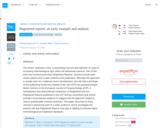
The recent ‘replication crisis’ in psychology has focused attention on ways of increasing methodological rigor within the behavioral sciences. Part of this work has involved promoting ‘Registered Reports’, wherein journals peer review papers prior to data collection and publication. Although this approach is usually seen as a relatively recent development, we note that a prototype of this publishing model was initiated in the mid-1970s by parapsychologist Martin Johnson in the European Journal of Parapsychology (EJP). A retrospective and observational comparison of Registered and non-Registered Reports published in the EJP during a seventeen-year period provides circumstantial evidence to suggest that the approach helped to reduce questionable research practices. This paper aims both to bring Johnson’s pioneering work to a wider audience, and to investigate the positive role that Registered Reports may play in helping to promote higher methodological and statistical standards.
- Subject:
- Applied Science
- Information Science
- Psychology
- Social Science
- Material Type:
- Reading
- Provider:
- PeerJ
- Author:
- Caroline Watt
- Diana Kornbrot
- Richard Wiseman
- Date Added:
- 08/07/2020